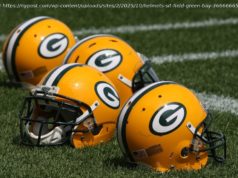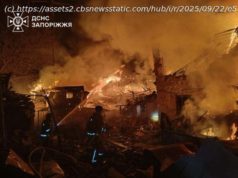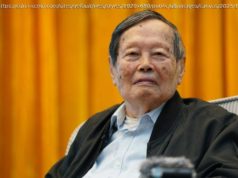North Korea said its new ballistic missile can carry a large nuclear warhead, claiming that the U. S. mainland is within its striking range.
North Korea said Monday that its long-range ballistic missiles, tested with stunning success over the weekend, can reach the U. S. mainland carrying a nuclear warhead.
A „large-size heavy nuclear warhead“ can fit on the Hwasong-12 missile launched near the city of Kusong in western North Korea, the state-run KCNA new service said. The missile flew almost 500 miles across the country and over water before slamming harmlessly into the Sea of Japan between Japan and Russia.
KCNA said the missile was fired at a high angle „in consideration of the security of neighboring countries, “ reaching a maximum altitude of more than 1,300 miles. Western missile trackers verified the test statistics.
Kim Dong-yub, a professor at South Korea’s Kyungnam University, told Yonhap news agency the missile might be able to reach Alaska and Hawaii if fired from a standard angle. North Korea, however, thus far has not displayed the capability to produce a nuclear warhead sufficiently compact to fly on its missiles.
U. S. Pacific Command said it tracked the flight of the missile and is „working closely with our Republic of Korea and Japanese allies to maintain security.“ The launch did not pose a threat to North America, said Marine Corps Major Rob Shuford, a command spokesman.
The North American Aerospace Defense Command (NORAD) determined the missile launch from North Korea did not pose a threat to North America.
North Korean leader Kim Jong Un was ecstatic with the test launch, saying Monday that if the U. S. „dares opt for a military provocation“ his nation is ready.
„If the U. S. awkwardly attempts to provoke the DPRK, it will not escape from the biggest disaster in history, “ he said.
The test came two weeks after North Korea fired a missile that broke up 21 miles into its flight, the fourth failed test in a row. Two tests earlier in the year had proved more promising.
Sunday’s test missile landed about 60 miles south of Russia’s Vladivostok region, but Russian President Vladimir Putin said Monday that the test posed no immediate threat to his country. Russia has diplomatic relations with the North and has not been a target of Kim’s wrath.
Putin did reaffirm his opposition to Pyongyang’s missile program and expansion of the global „nuclear club.“ Speaking at a news conference in China, he also appeared to chastise the U. S. for trying to „intimidate“ Pyongyang.
„We consider that nuclear and missile tests are unacceptable, “ Putin said. He added: „There is the need to resume dialogue with North Korea, to stop intimidating it and find peaceful solutions to problems.“
The test drew a global outcry. The White House called North Korea a „flagrant menace“ and called for tougher sanctions. South Korean President Moon Jae-in said the test was a „reckless provocation“ and clear violation of U. N. Security Council resolutions. The European Union and NATO also chimed in, calling the test „a threat to international peace and security.“






